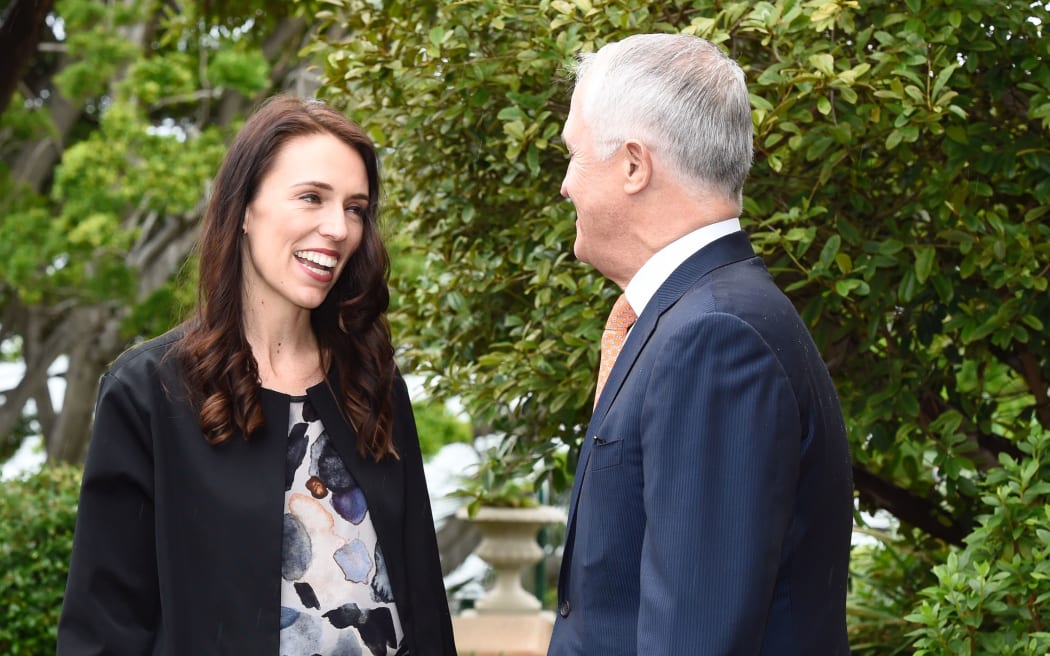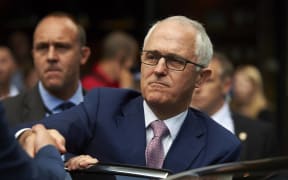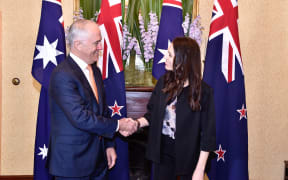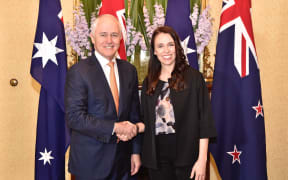Power Play - The ingredients were all there for a tense encounter, but a new trans-Tasman bond appears to have been forged over brunch on a drizzly day in Sydney, Jane Patterson writes.

Jacinda Ardern and Malcolm Turnbull met at Kirribilli House in Sydney Photo: Pool / Penny Bradfield
In strong show of symbolism Jacinda Ardern chose Australia for her first overseas port of call as Prime Minister, making a flying visit to meet with Malcolm Turnbull over the weekend.
There was plenty to talk about: an unfolding humantarian crisis on Manus Island refugee centre, inflammatory comments from the Australian Foreign Minister about Ms Ardern and trust, threats of retaliation from New Zealand over Australian domestic policy and the Australian government's majority on a knife edge because of a New Zealand citizenship.
But it was all smiles after the pair emerged from a two hour meeting, with Mr Turnbull saying they "had hit it off well", marking the start of a yet another trans-Tasman prime ministerial relationship.
Over fresh fruit, salmon and croissants with figs and prosciutto, Ms Ardern offered once again to take 150 refugees from Manus Island, as the stand-off continues with 600 men in the abandoned detention centre without food or running water.
Australia closed the centre and withdrew its staff last week, but the detainees have locked themselves in, saying they fear for their safety if they move out into the local community.
However Malcolm Turnbull is still pinning Australia's hopes on a refugee swap deal struck with the Obama administration to resettle 1250 asylum seekers in the United States, in return for Australia accepting refugees from Central America.
It was an agreement that irritated Mr Obama's successor Donald Trump so much it derailed Mr Turnbull's first phone call with the President at the start of the year.
President Trump described it as a "dumb deal" that would "kill" him politically, given his election campaign rhetoric on immigration and refugees.
The slow progress of resettlement so far, with only about 50 refugees from Manus Island and Nauru having been sent to the US, may be one reason Mr Turnbull is effectively keeping the New Zealand offer on the back burner.
If he can make the US deal work, it would go a lot further towards solving the problems posed by the Australian-run detention centres on Nauru and Manus Island in Papua New Guinea, than New Zealand's much more modest offering.
Mr Turnbull is also playing to a domestic voting audience - he cannot be seen to be going 'soft' and yielding any ground to people smugglers or those eyeing Australia as an easy target.
He not only has the conservative base of his own party to contend with, but Pauline Hanson and her One Nation Party are also lining up for a strong showing in the Queensland state elections with their strong anti-immigration message.
Ms Ardern has shown some deference to Australia by saying she would not bypass Australia and deal directly with the Papua New Guinea government instead.
Her rationale is without a specific rejection the offer to Australia is still live, therefore New Zealand will continue to deal with Australia.
That is despite the fact it is the PNG government that now has to deal with the fall-out of the centre's official closure, and the plight of the hundreds of men who remain within its walls.
But Ms Ardern has drawn one line in the sand; she won't increase the number New Zealand would take, beyond the 150, as part of this country's existing refugee quota.
In a move likely to play well domestically is her repeated intention for New Zealand to retaliate if Australia pushes ahead with changes to tertiary policy that would treat New Zealanders the same as foreign students, significantly boosting their fee payments.
Both leaders were unapologetic about making changes to their own legislation that could negatively impact on citizens of other countries.
Ms Ardern has taken a stance her predecessors John Key and Bill English were unwilling to take for fear of sparking a tit for tat trans-Tasman dispute.
The elephant in the room neither Prime Minister felt the need to address were the comments some months ago by the Australian Foreign Minister, Julie Bishop, that she would find it hard to trust a government led by Ms Ardern, in the wake of the Barnaby Joyce citizenship controversy.
It was not in the interest of either Prime Minister to dwell on the spat, with plenty of other serious matters that will test their newfound relationship.







